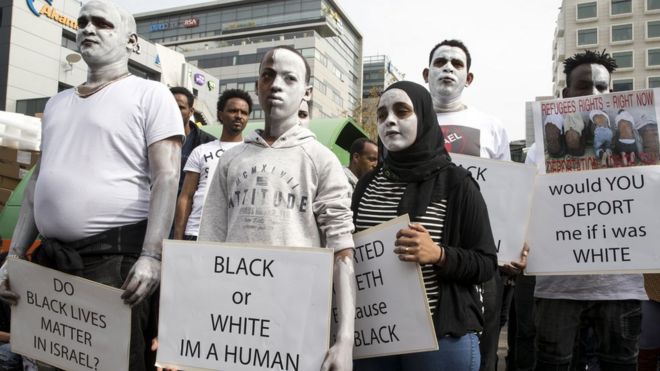
Israel has cancelled plans to deport migrants en masse to Africa after reaching a deal with the United Nations refugee agency.
Some 16,250 African migrants, many seeking asylum, will instead be resettled in Western nations, including Canada, Italy and Germany, according to Prime Minister Benjamin Netanyahu.
The same amount will be given residency in Israel, he said.
But Italy has already denied it is part of the deal.
Foreign ministry sources in Rome were quoted by the Italian media as saying “there is no agreement with Italy” in the pact between Israel and the UN.
The original plan to send male African migrants to third countries in Africa – reported to be Uganda and Rwanda – was condemned by Israeli activists and sparked protests.
Israel’s Supreme Court had blocked deportations meant to begin on Sunday.
The new plan, which the Israeli government described as “unprecedented”, will be implemented over a five-year period.
“These understandings will allow the removal of more migrants from Israel than in the previous plan, and under UN and the international community’s auspices,” a statement from Mr Netanyahu’s office said.
For each migrant resettled overseas, Israel will give “temporary residence” to a migrant in Israel, Mr Netanyahu told a news conference.
Canada and Germany are yet to officially confirm their participation. In Italy, an anti-immigrant alliance emerged with the most votes in last month’s election, and the dominant member, the far-right League, has pledged to expel undocumented immigrants if it leads a new government.
Where are the migrants from?
Most of the 42,000 African migrants in Israel are from Eritrea – a one-party state whose leaders have been accused of crimes against humanity by a UN inquiry – and war-torn Sudan.
- Read about Eritrea
- More on Sudan
- Israel’s unwanted African migrants
They say they fled danger at home and that it is not safe to return to another African country, but Israel considers the majority of African asylum seekers to be economic migrants.
Most of them entered from Egypt several years ago, before a new fence was built along the desert border. This has ended most illegal crossings.
How controversial is this issue?
The decision in January to offer the migrants a cash lump-sum and a plane ticket to leave Israel voluntarily or otherwise face forced expulsion was controversial in Israel.
Some critics in the country and among the Jewish community abroad – including former ambassadors and Holocaust survivors – said the plan was unethical and a stain on Israel’s international image. The UN refugee agency said it violated local and international laws, and large protests were held in Israel.
Mr Netanyahu said the opposition was “baseless and absurd” and that Israel would resettle “genuine refugees”.
Activists, however, noted that only a handful of Eritreans and Sudanese had been recognised as refugees by Israel since the country took over the processing of applications from the UN in 2009.
Reports say the plan for forced expulsions was abandoned and the deal with the UN agreed because Rwanda and Uganda objected to the deportation of asylum seekers against their will.
How have people reacted?
Opposition leaders and activists in Israel hailed the new deal on Monday.
“I congratulate the activists who fought, campaigned and did not give up,” said Avi Gabbay, head of the Zionist Union, the largest opposition grouping in the Israeli parliament.
Michal Rozin, a member of Israel’s parliament and a lead campaigner against the expulsions, said the agreement represented the “success of the Israelis who protested against the evil of deportation”.
But Naftali Bennett, head of the Jewish Home party that is part of Mr Netanyahu’s governing coalition, condemned the plan.
He called it a “total surrender to the false campaign in the media” and said the credibility of the government was at stake.
Shlomo Maslawi, a Tel Aviv councillor who has organised protests against the presence of many African migrants in the south of the city, said the deal was a “disaster that will reverberate for generations to come”.
Mr Netanyahu defended the agreement, saying it “protects the interest of the State of Israel and gives a solution to the residents of southern Tel Aviv and other neighbourhoods, and also the people who came into Israel”.
source:-BBC



